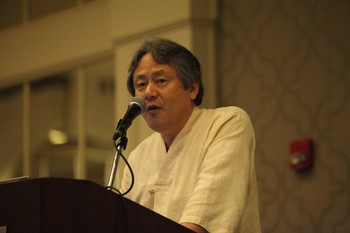In a Big Tent address Aug. 2, the general secretary of the Presbyterian Church of Korea called for a “radical change in the worldview of mission and evangelism.”
An anthropocentric worldview, a dualistic perspective on humanity and nature, has influenced Christian mission and evangelism, the Rev. Hong Jung Lee told a plenary session of the Big Tent’s World Mission conference.
This worldview has “legitimized the exploitation of nature, women, indigenous people and non Western culture.” Lee contended that it has also contributed to “colonial missionary ideas.”
Big Tent, Aug 1-3, is a celebration of Presbyterian Church (U.S.A.)’s mission and ministry organized around the theme “Putting God’s First Things First.” It’s composed of 10 national Presbyterian conferences, more than 160 workshops and special events to mark the 30th anniversary of the formation of the PC(USA) and the 25th anniversary of the opening of the Presbyterian Center here.
Lee stressed to the World Mission audience that “the world has been critically broken and wounded” and that another way of thinking is needed for the church to make a difference. In the accelerating course of over-production, over-consumption and over-disuse, we may be the last generation of humanity to have an opportunity to avert ecological collapse and irreparable damage to the living eco-system,” he said.
The world is yearning for healing and reconciliation, Lee emphasized. “And in the midst of this crying, we hear the voice of the Incarnated God in Jesus Christ, which manifests the purpose of God’s mission and evangelism: ‘I have come that they may have life, and have it to the full.’” (John 10:10b)
In order to make a difference in today’s world, the church should embrace a “life-centric systemic view,” Lee said. This vision of the world, he explained, requires self emptying and interdependence that leads to “God’s economy of life.”
“In the life-centric systemic view, the world is not seen as a pyramid with humans on top but as a web of life,” he said. “Humans are but one strand in that web, and as we destroy other strands, we destroy ourselves.”
The life-centric systemic view, moves mission and evangelism “from spiritual-cultural superiorism and western Christendom-centrism to wholeness in terms of the understanding of the territory of mission, the nature of human beings and the missional nature of local churches.” Lee said it knocks down walls of division.
He explained: “In God’s mission and evangelism, there is no dualistic boundary between soul, spirit and body, human and nature, subject and object, theological ideologies, western Christendom and the non-Western Christian world, missionary sending and receiving churches, women and men.”
Instead, Lee said, there is “the whole interpenetrating boundaries of life, the whole integrated gospel, the whole interconnected church, and the whole interdependent world.”

